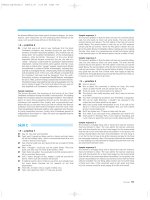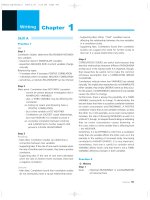Tài liệu A resource for reading and words part 10 pptx
Bạn đang xem bản rút gọn của tài liệu. Xem và tải ngay bản đầy đủ của tài liệu tại đây (212.53 KB, 15 trang )
r EXERCISE
Complete the sentences with a suitable form of the words
defined above.
1. I am to carry on with the exhausting task of caring for an
old and woman,
2. This arrangement left her with the responsibility of her
younger son's education, which she decided to a
private tutor.
3. I believe the of men's jobs to women's is 8 to 1.
4. Your course leader will be to help you.
5. We can not accept the housing conditions and will take
whatever action is necessary
READING COMPREHENSION
1. It is obvious in the passage that the writer criticizes
A) the situation of the institutions which provide care to the old
people,
B) the mental hospitals where the aged are treated.
C) the boring and meaningless nursing homes.
D) people who have little to do but wait for their deaths.
E) the wide attention that nursing homes receive,
2. The writer points out that noone
A) shows unwillingness to concern for the institutions.
B) asks about the facilities for old people.
C) places a parent in an institution.
D) is happy about the therapy equipment available.
E) is interested in what is going on in the institutions.
3. The same lack of interest in the institutions for the old people
A) are not true for the mental hospitals.
B) is only the characteristic of people on the outside.
C) has nothing to do with the attitude of society.
D) is considered to be boring and meaningless.
E) can be seen in the relatives of those placed in these
institutions.
PASSAGE 68
Regression, one of the defense mechanisms, is withdrawal
into the past. If the rejected fellow regressed in a childlike
way, he would behave as a child. He might burst into tears, or
pout, suck his thumb, throw things, scream, and have a
tantrum. Regression calls for a return to earlier ways of
handling problems. It is generally used when a person is
deeply upset and cannot cope in a mature manner. Young
children who have been toilet-trained and taught to drink
from cups often regress and forget their training when a new
baby arrives in their home. The older child does not know
how to win parental affection in the new situation.
Consequently the child must resort to previous methods for
gaming attention and love. The result is regression.
VOCABULARY
> DEFINITIONS
Defense: protection To call for: To require
Withdrawal: departure, retreat To resort to: To turn to
Tantrum: fit, fit of temper To regress: to go back,
To burst into: To break into Affection: love, care
To pout: to show displeasure Rejected: abandoned
To handle: to deal with, to cope with, To cape: to handle
To suck: to draw into the mouth by the use of lips
Parental: relate'd to parents
^ EXERCISES
Complete the sentences with a suitable form of the words
defined above.
1. Some broken bones are enough to cause your from
competition, regardless of the stage you are at.
2, She sees nothing wrong in smacking a toddler who is
having a
3. When he is asked what he will do after his own group
splits/ he usually humor.
4. We are satisfied with the way in which our complaints
were
5. I him to an earlier period in this life to find the roots of
his fear.
READING COMPREHENSION
1. If a person cannot find the love and care he expects, he
A) only cries to get help for his problem.
B) does the things that are not suited to an adult.
C) wishes to handle his problems in a mature way.
D) must behave as a child and suck his thumb.
E) should turn back to earlier ways of solving problems.
2. Young children often regress because
A) they have been toilet-trained by their parents.
B) the arrival of the new baby makes them so happy that they
forget all they learnt.
C) the older child does not let them win the parents' affection.
D) the attention and love towards them decrease.
E) they are taught to drink from cups in the new situation.
3. From the passage we understand that regression
A) occurs when one can not cope with problems maturely.
B) is becoming deeply upset and not knowing what to do.
C) means the end of parental affection towards adults.
D) is resorting to mature ways of overcoming problems.
E) results from forgetting the things a person learnt when he was
a child.
PASSAGE 69
HOW TO-LODGE A COMPLAINT
One of the greatest frustrations in complaining is talking to a
clerk or receptionist who can't solve your problem and whose
only purpose seems to be to drive you crazy. Getting mad
doesn't help, for the person you're mad at probably had
nothing to do with your actual problem. When complaining
in person, ask for the manager or supervisor. When
complaining by letter, get the name of the store manager or
company president. (A librarian can help you find this
information.) If you are complaining over the phone, ask for
the customer-relations department. If there is none, then ask
for the manager or appropriate supervisor. Or talk to the head
telephone operator, who will probably know who is
responsible for solving problems. Be persistent. One
complaint may not get results. In that case, it may work to
simply keep on complaining. This will "wear down"
resistance on the other side. If you have a problem with a
store, call the store two or three times every day. Chances are
someone there will become fed up with you and take care of
your complaint in order to be rid of you.
VOCABULARY
> DEFINITIONS
Complaint: complaining To drive crazy: To make crazy
Appropriate: suitable, proper To rid: To do away with
To take care of: To deal with
To complain: to say that one is not satisfied
To lodge a complaint: to make a complaint
Frustration: disappointment, dissatisfaction
Supervisor: person who watches or directs
Persistent: insistent, not giving up
To keep on: to continue, to carry on
To wear down: to make gradually weak
Resistance: Power of opposing (using force against)
r EXERCISE
Complete the sentences with a suitable form of the words
defined above.
1. For many a stay in hospital is but they are often too
weak or ill to care for themselves properly
2. He is suffering from , irritable cough
3. Most governments are by failures (particularly
economic), scandals, lack of purpose, and electoral
boredom.
4. "No, no," the Finnish detective said, shaking his head as if
himself the last remnants of misunderstanding.
5. Far from being grateful, she the smell within and
declared that sleeping in the open air had its merits.
READING COMPREHENSION
1. A clerk or a receptionist fails to provide solutions to our
problem because
A) their job is to make people mad.
B) they are not the right people to make complaints to.
C) clerks are frustrated by complaints.
D) they have nothing to do with customers.
E) their only purpose is to drive.
2. The effective way to solve one's problem is
A) to give the name of the store manager to the company
president.
B) that one should ask librarians for their problems.
C) to complain over the phone.
D) to make operators responsible for solving problems.
E) to ask for the manager or supervisor.
3. The writer suggests that if one complaint does not work, the
person should
A) make simple complains.
B) take care of one's problem.
C) not give up.
D) be lucky.
E) get tired of complaining.
139
PASSAGE 70
DRUNK DRIVING
The majority of automobile accidents result from alcohol. A
person who has drunk too much beer gets into a strange state
called drunkenness. This state is marked either by an
unpleasant feeling of loss of balance, or by falling asleep.
Either of these problems is dangerous for drivers. On the
road, a drunk driver is too dizzy to pay attention to traffic
signs, and his lack of control may lead him to run a stop sign,
exceed the speed limit, or swerve his car. As a result, he may
either hit another car or a person. It is very likely that he will
crash his car and often he will kill or injure himself or others.
Therefore, the government has established stricter laws
against drunk drivers.
VOCABULARY
> DEFINITIONS
To result from: to be caused by
Drunk: under the influence of alcohol
Drunkenness: state of being drunk
To mark: to indicate, to be a sign of
Dizzy: to feel as if everything were tuning around
To pay attention to: to watch, to be cautious about
To exceed: to go beyond, to surpass
To establish: to set up, to start
To lead: to direct
To swerve: to change direction suddenly
Strict: demanding, obedience
> EXEKCI5E
Complete the sentences with a suitable form of the words
defined above.
1. I have to sit down because I feel all
2. Classes are by experienced staff, and at the end of the
five weeks groups will usually be given a certificate for
having attended the course.
3. Single rooms, and twin bedded rooms with extra beds are
available at most hotels although the demand for single
rooms always availability.
4. The coroner may also order an inquest the
circumstances of the death.
5. The robbers' car, wildly, disappeared round a corner.
READING COMPREHENSION
1. Drunkenness occurs when a person
A) takes excessive alcohol.
B) gets into a strange state.
C) loses his balance.
D) has an unpleasant feeling.
E) falls asleep when driving.
2. Drunk drivers are liable to
A) pay attention to traffic rules.
B)
drink too much beer.
C)
observe the speed limit.
D)
violate traffic rules and have accidents.
E)
slow down at a stop sign.
3. The laws established by the government
A)
are not approved by drivers.
B)
were not so strict in the past as they are now.
C)
lead the drivers to run a stop sign.
D)
cause the drivers to injure themselves or others.
E)
were always strict and effective.
PASSAGE 71
RAISING HOUSEPLANTS
Raising houseplants involves nearly as much care and
knowledge as raising children. First, both plants and children
are sensitive to their environments. For example
/
a plant will
grow faster and 'be much healthier if it is raised in an
environment of tender, loving care. The same is true for a
child, who will be happier and healthier if his parents love
and nurture him. Similarly, proper care of houseplants
requires a basic knowledge of plants on the part of the owner.
He must know, for example, which of his plants need direct
sunlight and which need to be kept in shady places, and how
much water each plant requires for the best growth and
appearance. Parents, too, must have a basic knowledge of
their children's needs in order to provide what is necessary
for the best physical and mental development.
VOCABULARY
> DEFINITIONS
To involve: to require, to necessitate, to mean.
To raise: to grow
To require: To necessitate, to call for
Tender: loving, caring, affectionate
To nurture: to care for, to look after
Proper: suitable, appropriate
Shady: protected or free from sun
Appearance: look
> EXERCISE
Complete the sentences with a suitable form of the words
defined above.
1. The Group will be in the development of human rights
• awareness.
2. A small per cent of children in rural areas used to
experience schooling.
3. For years, she had an ambition to set up her own
business.
4. The global dimension of AIDS individual organisations
and communities to rapidly develop their own local
approaches and responses to the problem.
5. Sun-loving plants must not be planted in parts of the
garden.
READING COMPREHENSION
1. The writer argues that environment
A) plays an important role in the development of both children
and plants.
B) has no effect on plants.
C) has nothing to do with child raising.
D) is important if the plants are sensitive.
E) children are in does not concern parents.
2. If a person doesn't have enough knowledge of plants,
A) he can't raise a child.
B) plants should be kept in shady places.
C) their growth will be affected negatively.
D) they grow faster.
E) his plants need direct sunlight.
3. Love and care
A) should only be given to children.
B) are not so essential for children as for plants.
C) requires basic knowledge of plants.
D) will only help raise happier and healthier children.
E) are necessary not only for children but also plants.
PASSAGE 72
CLASS ACTIVITIES
Through the class activities the teacher can develop creativity
in the preschool child by giving importance and value to what
the child has made and by encouraging him to develop his
own ideas and thoughts. For example, when the child paints a
boat on the sea, the teacher could ask him what he had
painted, what colors he had used and why he had painted it.
In this way, not only the teacher, but also the child is
evaluating and describing the product. Furthermore, if the
teacher ascertains that a child is not happy with the task he
has accomplished, the teacher should show him the value of
the task. This will give the child security in his work and will
allow him to further develop his creativity.
VOCABULARY
> DEFINITIONS
Through: by means of
To encourage: to give courage to, to support
To evaluate: to find out or decide the value of, to assess
Furthermore: moreover, in addition
To ascertain: To learn, to find out, to discover
Task: piece of work to be done
To accomplish: To achieve, to carry out, to do
Security: Protection, safety ,
Further: more, in addition
Creativity: Inventiveness, imagination
>
EXERCISE
Complete the sentences with a suitable form of the words
defined above.
1. If there is confusion between goals and methods, explain
that any one goal may be achieved several different
methods.
2. Above all, the child's wishes and feelings must be and
taken into account in all decisions that are made.
3. In the final discussion stage, the students will their
work.
4. We set ourselves the of raising money for the needy
students on the campus
5. The committee members will begin the discussion upon
the best method of the task in hand.
READING COMPREHENSION
1. The children mentioned in the passage
A) don't have their own ideas.
B) haven't started school yet,
C) aren't interested in class activities.
D) are first year students in the primary school.
E) dislike drawing pictures.
2. The child can evaluate and describe what he has done
A) by learning the teacher's idea about it.
B) after he developed his own ideas.
C) when they are allowed to paint pictures.
D) providing he knows what colors he used.
E) if he is asked questions about his product.
3, Telling the child how valuable and important his task is
A) encourages a child to participate in activities.
B) won't make him happy with his task,
C) will encourage him to produce new and original things.
D) allows the teacher to increase his creativity.
E) develop the teacher's creativity.
PASSAGE 73
HAPPINESS
Happiness means different things to different people. For
example, some people believe that if they have much money
or many things, they will be happy. They believe that if they
are wealthy, they will be able to do everything they want, and
so they will be happy. On the other hand, some people
believe that money is not the only happiness. These people
value their religion, or their intelligence, or their health; these
make them happy. For me, happiness is closely tied to my
family. I am happy if my wife, my children and I live in
harmony. When all members of my family share good and sad
times, and when my wife and I communicate with each other
and work together, I am happy. Although the definition of
happiness depends on each individual, my "wealth" of
happiness is in my family.
VOCABULARY
> DEFINITIONS
Wealthy: rich, well off
To value: to give importance
To be tied to: to be joined, to be attached
In harmony: in agreement
To share: to divide and distribute
To communicate with: to talk with
To depend on: to be affected or determined by
> EXERCISE
Complete the sentences with a suitable form of the words
defined above.
' 1. Gardeners know the of a really sharp knife for pruning
as well as propagating.
2. They uphold the feasibility of two billion people, diverse
in language, color, nationality and religion, living together
in .,
146
3.
These programs are part of the operating system — the set
of commands which come with the computer and allow
you with it.
4.
The novelist threw himself down the staircase of the house
he with his wife and mother.
5.
Cool or warm, vivacious or romantic, a garden design
on the color mix
READING COMPREHENSION
1. It is clear in the passage that the definition of happiness
A) is quite impossible.
B)
satisfies no one.
C)
is the same for all people.
D)
changes from person to person.
E)
is being rich and doing anything one wants.
2. According to some people happiness means
A) sad times.
B)
good health.
C)
being unable to do everything.
D)
having no religion.
E)
nothing.
,3. The writer is happy so long as
A)
there is no disagreement among family members.
B)
he communicates with his children.
C)
he has enough money to live with his family.
D)
his health is good.
E)
his family has good and bad times.
PASSAGE
If recycling of the rubbish is too complicated, then the
government should consider other ways of salvaging raw
materials from our rubbish, or at least putting it to better use.
At the moment 90 % of our rubbish is dumped, sometimes
near well-known beauty spots. In Japan they crush their
rubbish, coat it in concrete and use it for making roads. In
Sweden whole blocks of flats are heated by burning domestic
rubbish in special incinerators, and in America they've found
a way of obtaining oil and gas from rubbish. They do not
waste their waste but are finding new fuels. It is time we
started to think seriously about the growing shortage of raw
materials in the world today and stopped this mad
destruction of our environment by our throw-away society.
/
VOCABULARY
To recycle: to reu^, to iv
Complicated: complex
To' consider: to think about
To salvage: to save, to. recover
Raw: unprocessed, untreated
Rubbish: waste
At least: no less than
To dump: to throw, to get rid of
Spot: place, site, location
To crush: to squeeze, to compress
To coat: to cover
Incinerator: closed fireplace for burning rubbish etc.
Growing: rising, increasing
Throw-away: in the habit of throwing away .
> EXERCISE
Complete the sentences with a suitable form of the words
defined above.
1.
We should praise the efforts being made to-extract energy
from waste and paper, glass, plastics and steel cans.
2.
In 1972 the diver Robert Marx, who has specialized in the
of treasure from wrecks around the world, located the
"Maravillas" from nautical charts,
3.
Either or boiled oil may be used to make this salad.
4.
If people begin
sewage in the sea, it will be impossible
to swim here.
5.
I must stress that only aluminum cans are acceptable and,
if possible, they should be as they take up less room.
READING COMPREHENSION
1. The writer urges authorities to make good use of rubbish
A)
because we not only pollute our environment with our
rubbish but also rapidly run out of raw material.
B) by just throwing it away
C) although he knows that it can not be recycled
D) and destroy the beautiful natural spots
E) by getting rid of it
2. We understand from the passage that
A) ten percent of our rubbish is dumped
B) the government can do nothing to recycle rubbish
C) rubbish can be used as a source of raw material
D) authorities are not willing to reuse the waste materials
E) rubbish is burnt out in Japan
3. It is clear in the passage that
A) in no part of the world can rubbish be cycled
B) there is no way to make use of rubbish
C) rubbish is used for making roads in America
D) some countries make use of rubbish in various ways.
E) They use rubbish to obtain gas in Sweden.









